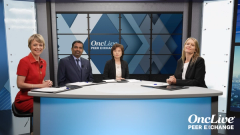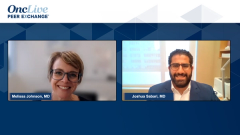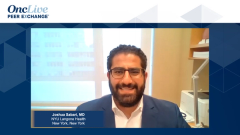
Emerging Strategies for the Management of NSCLC With KRAS/STK11/KEAP1 Mutations
Shared perspectives on the emerging strategies for the management of non–small cell lung cancer following the identification of KRAS/STK11, or KRAS/KEAP1 mutations.
Episodes in this series

Transcript:
Joshua Sabari, MD: I remember historically going back 5 or 6 years with the utilization of chemotherapy in combination with immunotherapy, we all thought it was crazy. Why would you use chemotherapy to immune-suppress somebody to potentially kill activated T cells? But lo and behold, KEYNOTE-189: That’s currently our standard of care for many patients. How would you think about using that regimen, KEYNOTE-189, vs the POSEIDON regimen, and is there a specific patient population you would consider?
Melissa Johnson, MD: That’s a good question, especially because we were maybe surprised to see in POSEIDON that it was the [patients with] nonsquamous [disease who] did especially well with the DURVA-TREME [durvalumab-tremelimumab] addition to chemotherapy, whereas [the combination of] carboplatin, pemetrexed, and pembrolizumab is a well-established standard for [patients with] nonsquamous disease worldwide. That’s because it’s well tolerated, and we’ve all had the opportunity to use it like a well worn-in slipper that you know exactly what it feels like and you know just how to put it on. I think that’s CARBO-PEMBRO [carboplatin-pembrolizumab] for most people. That’s not a place where I’m as tempted by the addition of tremelimumab. The PD-L1–zero nonsquamous [place] is where I’m going to think about CTLA4, but with any amount of PD-L1, I’m also considering the KEYNOTE-189 regimen. I think you make a good point. We need to evaluate prospectively whether these difficult-to-treat mutations still do better relative to the others. A couple points that I wanted to tease out about those difficult-to-treat mutations: We’ve talked a lot today about STK11 and KEAP1, but what about KRAS? There was an interesting abstract just reported at SITC [Society for Immunotherapy of Cancer meeting], real-world data looking at how patients with KRAS G12C mutations did with chemoimmunotherapy relative to STK11 and KEAP1. Does that abstract resonate for you with your real-life clinical practice in terms of how the patients did?
Joshua Sabari, MD: It does. It’s a really interesting abstract presented by Charu Aggarwal, [MD, MPH,] and [the University of Pennsylvania]. I think it was close to 3000 patients with advanced non–small cell lung cancer who were treated in the frontline setting. Those patients all had the Tempus assay. Again, this is a real-world analysis. This is probably as good as we can get without doing a large prospective clinical trial. They looked at patients who were treated in the front line with chemo[therapy], chemo[therapy]/IO [immuno-oncology], or IO alone. They stratified patients by KRAS mutation, whether it was KRAS mutant or wild type or G12C, and I was impressed. They identified about 30% of patients [with] KRAS-mutant [disease], like what you experienced in your own clinical practice, and it’s what I see myself as well. About 11% of those patients were [positive for] G12C. It’s interesting here in New York—our patient population is slightly different; [people] don’t smoke as much, we see more EGFR [epidermal growth factor receptor], so my own numbers are probably 8%, 10%, but I’m sure, Dr Johnson, in your practice, you’re probably seeing it at 14%, 15%, or so.
Melissa Johnson, MD:A hundred percent. It is definitely a regional phenomenon, how much we see some mutations vs others. There have been other retrospective analyses that have shown us that patients with KRAS G12C mutations do well with immunotherapy. It makes sense to me because KRAS G12C is a neoantigen, so when there is a mutation there, that allows the immune system to see the cancer, where some of the other KRAS mutations may not be. It makes sense that there are results showing that these patients with KRAS G12C mutations do well with immunotherapy. Unfortunately, it’s going to be the KRAS G12V, the KRAS G12D, and the KRAS G12X, I should say concurrently with some of these other mutations that are predictors of less good outcomes.
Transcript edited for clarity.












































